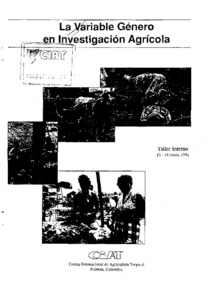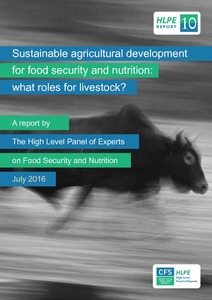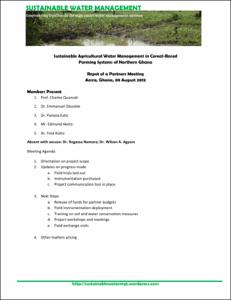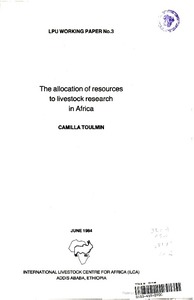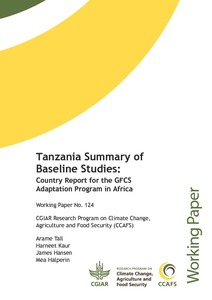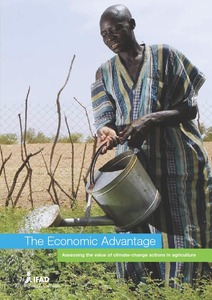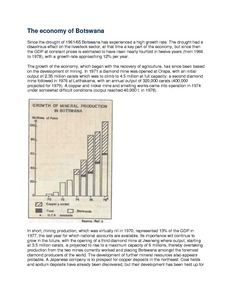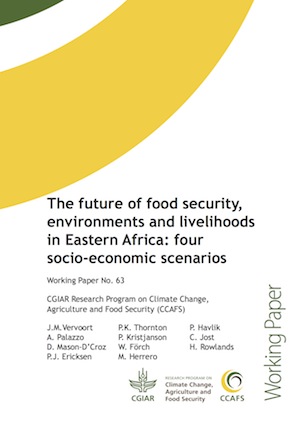Taller Interno La Variable Género en Investigación Agrícola (1991, Palmira, Colombia). La variable género en investigación agrícola
Sustainable agricultural development for food security and nutrition: What roles for livestock? A report by the High Level Panel of Experts on Food Security and Nutrition of the Committee on World Food Security
This report addresses the economic, environmental and social dimensions of agricultural development, with the objective of ensuring food and nutrition security, in terms of availability, access, utilization and stability. It focuses on the livestock component of agricultural systems, given the role of livestock as an engine for the development of the agriculture and food sector, and as a driver of major economic, social and environmental changes in food systems worldwide.
Sustainable agricultural water management in cereal-based farming systems of northern Ghana: Report of a Partners Meeting, Accra, Ghana, 8 August 2012
The allocation of resources to livestock research in Africa
Looks at the allocation of resources to livestock research in Africa. Assesses the role of agricultural research and its value to national governments. Investigates the appropriate criteria to use for decision making by comparing three kinds of decision-making models. Presents conclusions for policy-making.
Tanzania Summary of Baseline Studies: Country Report for the GFCS Adaptation Program in Africa
This report reflects upon the consolidated findings from the baseline and scoping studies conducted under the auspices of Global Framework for Climate Services (GFCS) Adaptation Programme in Africa. It identifies gaps in climate information access and use at the local level, type of climate services farmers and pastoralists need in Tanzania, relevant channels to reach farmers with requested services, lead-time and gender specific requirements.
Targeting, bias, and expected impact of complex innovations on developing-country agriculture: Evidence from Malawi
Technological change and deforestation: a theoretical overview
This chapter spells out the theoretical framework for the discussion and case studies of the book. First, it provides precise definitions of technological change and classify technological change into different types based on their factor intensities. The discussion starts off with a single farm household. Two key concepts for understanding how that household will respond to technological changes are economic incentives and constraints. The former relates to how new technologies influence the economic return of different activities.
Temporal change in land use by irrigation source in Tamil Nadu and management implications
Interannual variation in rainfall throughout Tamil Nadu has been causing frequent and noticeable land use changes despite the rapid development in groundwater irrigation. Identifying periodically water-stressed areas is the first and crucial step to minimizing negative effects on crop production. Such analysis must be conducted at the basin level as it is an independent water accounting unit.
The Economic Advantage: Assessing the value of climate-change actions in agriculture
This report is aimed at readers who seek to build economic evidence in support of the inclusion of actions on agriculture in climate change plans and programmes, particularly at the national level under the umbrella of nationally determined contributions (NDCs) to the December 2015 Paris Agreement, which aims to restrict a rise in global temperatures and manage risks.
The economy of Botswana
Survey on the economy of Botswana, w. emphasis on mining production, gross domestic product, prices, cereal production, and livestock and meat export.
The future of food security, environments and livelihoods in Eastern Africa: four socio-economic scenarios
This report presents 4 scenarios for the future of food security, agriculture, livelihoods and environments in East Africa. These scenarios were developed by the CGIAR Research Program on Climate Change, Agriculture and Food Security in collaboration with a wide range of regional stakeholders. The report discusses the theory and development process


